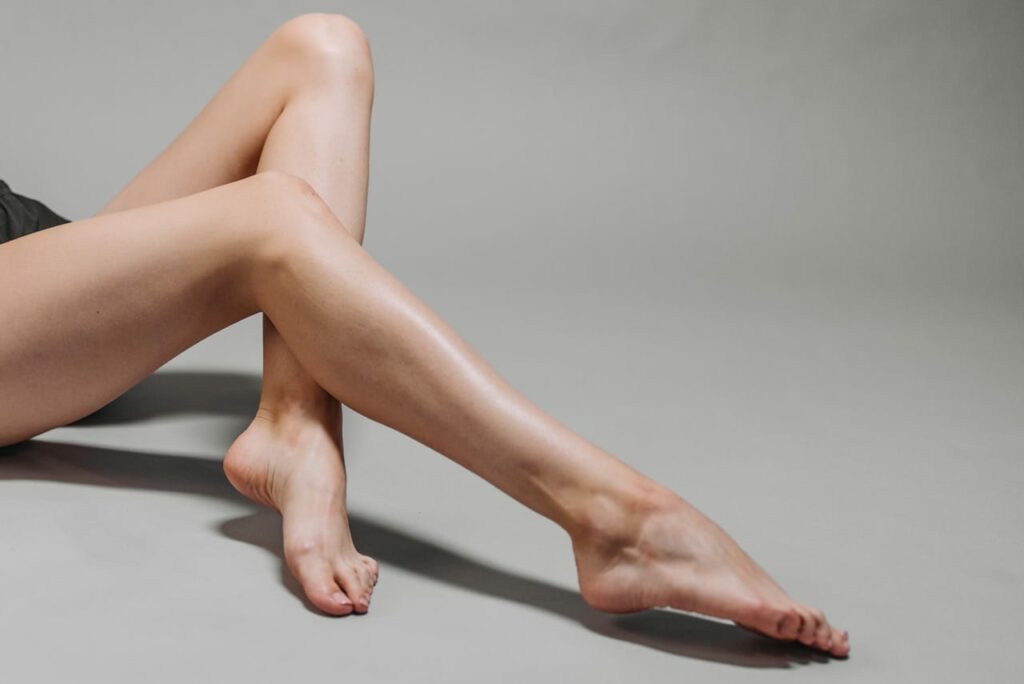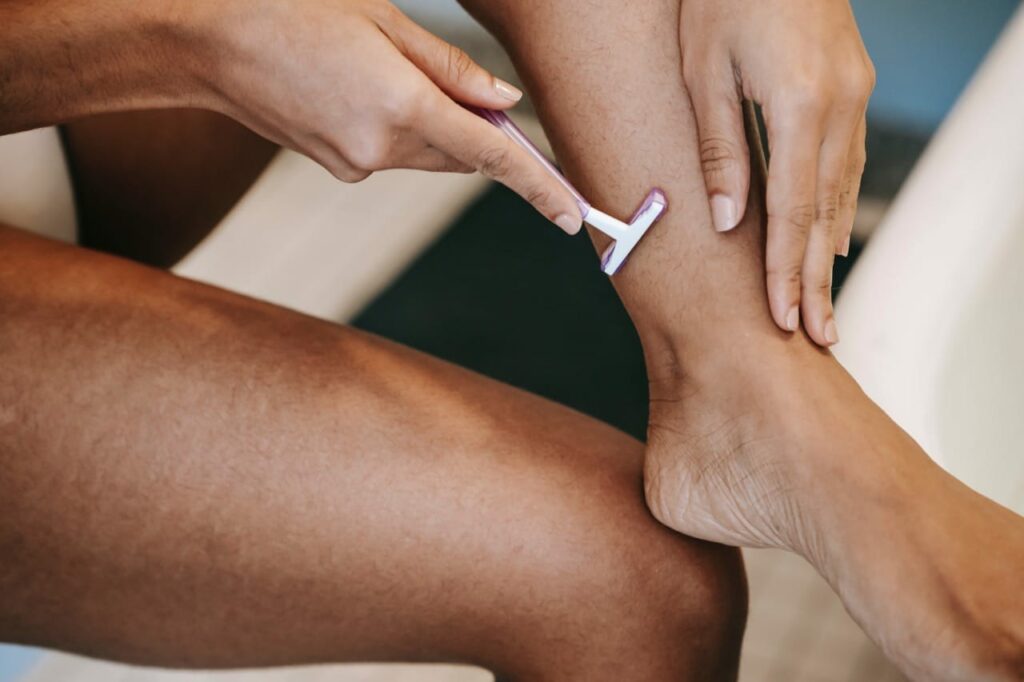Ingrown hairs can be a frustrating and painful experience, causing discomfort, inflammation, and even scarring. These bumps and redness occur when a hair grows back into the skin instead of up and out of the follicle. Laser hair removal is an effective solution for ingrown hairs, providing long-term results and smooth, clear skin.
In this article, we’ll explore the benefits of laser hair removal for ingrown hairs, how it works, and what to expect during and after treatment. We’ll also cover considerations when choosing the best laser hair removal treatment for your needs and how to prepare for the procedure.
Key Takeaways
- Laser hair removal is an effective solution for ingrown hairs.
- This treatment inhibits hair growth and reduces the occurrence of ingrown hairs.
- Choosing the right practitioner and technology for laser hair removal is important for optimal results.
- Proper preparation and aftercare can help maximize the benefits of laser hair removal for ingrown hairs.
- Consider consulting with a qualified practitioner to determine if laser hair removal is right for you.
Understanding Ingrown Hairs and Their Impact on Skin
Ingrown hairs are a common problem that can affect anyone who engages in hair removal methods such as shaving, waxing, or plucking. When the hair regrows, it may curl or grow sideways into the skin, causing inflammation and discomfort. This can lead to pimples, redness, and even scarring.
While ingrown hairs are generally harmless, they can be unsightly and cause embarrassment, particularly on visible areas such as the face, neck, and bikini area. In severe cases, they can lead to infection and require medical attention.
Preventing ingrown hairs is preferable to treating them. Proper hair removal techniques and hygiene, along with gentle exfoliation, can help to prevent ingrown hairs from forming. However, despite taking these measures, ingrown hairs can still occur.
If you are struggling with ingrown hairs, there are various ingrown hair solutions available. In the following sections, we will examine the benefits of laser hair removal for ingrown hairs, how it works, and what to expect during the treatment.
Laser Hair Removal for Ingrown Hairs: How Does It Work?
Ingrown hairs can be frustrating and painful, but laser hair removal provides an effective solution to prevent their occurrence. This treatment works by targeting the hair follicle, inhibiting its growth and reducing the likelihood of ingrown hairs.
The process involves using a specialized laser that emits a concentrated beam of light onto the skin. This light is absorbed by the pigment in the hair follicle, damaging it and preventing further hair growth. Over time, the treated hair follicles will become inactive, resulting in less hair growth and a reduction in ingrown hairs.
During the laser hair removal session, a cooling gel may be applied to protect the skin and minimize any discomfort. Depending on the area being treated, the session may take anywhere from a few minutes to an hour.
Laser Hair Removal for Ingrown Hairs: How Does It Compare to Other Methods?
Laser hair removal is a more effective option for preventing ingrown hairs compared to other hair removal methods such as shaving, waxing, and threading. These methods can cause hair to grow back unevenly and increase the chances of ingrown hairs.
While laser hair removal requires multiple sessions to achieve long-lasting results, it is a more permanent solution compared to other methods. This treatment targets the hair follicle itself, leading to a more permanent reduction in the number of hairs in the treated area.
Laser Hair Removal Benefits
Laser hair removal provides numerous benefits for preventing ingrown hairs and achieving smooth, clear skin. These benefits include:
- Long-lasting results: Unlike other hair removal methods, laser hair removal provides more permanent results, reducing the need for frequent touch-ups.
- Reduced ingrown hairs: By targeting the hair follicle, laser hair removal significantly reduces the occurrence of ingrown hairs.
- Improved skin texture: Regular laser hair removal sessions can lead to improved skin texture in the treated areas.
- Pain-free: Compared to other methods like waxing, laser hair removal is relatively pain-free and minimally invasive.
Overall, laser hair removal is a safe and effective method for preventing ingrown hairs and achieving smooth, clear skin.
The Benefits of Laser Hair Removal for Ingrown Hairs
If you’re tired of dealing with ingrown hairs, laser hair removal may be the solution you’ve been searching for. This innovative treatment offers a range of benefits over other hair removal methods, especially when it comes to ingrown hairs. Here are some of the key benefits of laser hair removal:
| Benefit | Description |
|---|---|
| Long-term results | Unlike other hair removal methods, such as shaving and waxing, laser hair removal offers long-lasting results. The laser technology targets hair follicles and inhibits hair growth, reducing the likelihood of ingrown hairs in the future. |
| Reduced need for other hair removal methods | After undergoing laser hair removal treatment, many people find that they no longer need to shave, wax, or use other hair removal methods as frequently. This can save time and money in the long run, while also reducing the risk of ingrown hairs. |
| Improvement in overall skin texture and appearance | Ingrown hairs can cause redness, inflammation, and even scarring in some cases. By reducing the occurrence of ingrown hairs, laser hair removal can lead to smoother, clearer, and healthier-looking skin. |
Overall, laser hair removal is a safe and effective solution for ingrown hairs that offers a range of benefits over other hair removal methods. If you’re interested in learning more about this treatment and how it can benefit you, speak with a qualified practitioner today.
Is Laser Hair Removal Suitable for Everyone?
While laser hair removal can be an effective solution for ingrown hairs, it may not be suitable for everyone. Some factors to consider before undergoing treatment include skin type, hair color, and any existing medical conditions.
Individuals with darker skin may be at a higher risk for skin damage due to the higher levels of melanin in their skin. Those with blonde, gray, or red hair may not see optimal results, as the laser targets pigment in the hair follicle. Additionally, people with certain medical conditions, such as diabetes or a weakened immune system, should consult with a practitioner before beginning laser hair removal treatment.
It is important to disclose any medical conditions or medications to the practitioner prior to treatment to ensure a safe and effective experience. They will assess your individual situation and advise if laser hair removal is a suitable option for you.
Overall, it is best to consult with a knowledgeable practitioner and discuss your options before proceeding with any hair removal treatment.
Preparing for Laser Hair Removal Treatment
If you’re considering laser hair removal for ingrown hairs, it’s essential to prepare accordingly to ensure optimal results. Here are some tips to help you get ready:
Avoid sun exposure
It’s best to avoid direct sun exposure for at least two weeks leading up to your treatment. Sunburn or tan can interfere with the effectiveness of the laser and increase the risk of side effects.
Discontinue certain hair removal methods
Avoid waxing, plucking, or threading the targeted areas at least four weeks before your laser hair removal appointment. The laser needs the hair follicle to be intact to target it effectively, and these methods can damage it.
Stay hydrated and moisturized
Drink plenty of water and moisturize the treatment area daily to keep your skin healthy and hydrated. Dehydrated skin is more prone to irritation and damage from the laser. Refrain from applying any topical treatments, such as lotions or deodorants, before arriving at the appointment.
Discuss medications with your practitioner
If you’re taking any medication, such as antibiotics or anti-inflammatory drugs, let your practitioner know before the treatment. Some medications may interfere with the effectiveness of the laser or increase the risk of side effects.
Shave the treatment area
About 24 hours before your appointment, shave the targeted area to ensure that the laser can penetrate the skin effectively. However, avoid waxing, plucking, or threading as these methods can damage the hair follicle.
By following these tips, you can ensure a smooth and effective laser hair removal treatment for ingrown hairs. Speak to your practitioner for any additional advice or guidance.
What to Expect During Laser Hair Removal Sessions
If you’re considering laser hair removal for ingrown hairs, it’s natural to be curious about what happens during the treatment. Here’s a breakdown of what you can expect:
Consultation and Patch Test
Before your first laser hair removal session, you’ll have a consultation with your practitioner to discuss your medical history, skin type, and hair color. They may also perform a patch test to determine the appropriate laser settings for your skin.
Cleansing and Shaving
Prior to the treatment, your skin will be cleansed and shaved to ensure that the laser can effectively target the hair follicles.
Laser Application
Your practitioner will apply the laser to the designated area of your skin. You may feel a mild discomfort or heat sensation during this process, but it should not be painful.
Cooling and Soothing
After each laser application, your skin will be cooled and soothed with a cold compress or topical cream. This helps to minimize any redness or inflammation.
Repeat Sessions
Depending on your individual case, you may need multiple laser sessions to achieve the desired results. These sessions will be spaced several weeks apart to allow your skin to heal between treatments.
Overall, laser hair removal for ingrown hairs is a safe and straightforward process that can be completed in a relatively short amount of time. With proper aftercare, you can enjoy long-lasting results and smoother skin.
Laser Hair Removal Aftercare for Ingrown Hairs
Proper aftercare is essential for achieving the best results and preventing the occurrence of new ingrown hairs. Follow these guidelines after your laser hair removal treatment:
- Keep the treated area clean and dry for at least 24 hours after the treatment.
- Avoid hot baths, saunas, and intense exercise for 48 hours after the treatment, as heat can irritate the skin.
- Avoid sun exposure and use a high SPF sunscreen on the treated area.
- Avoid using scrubs, exfoliants, or any other harsh products on the treated area for at least a week after the treatment.
- Moisturize the treated area regularly to prevent dryness and irritation.
- Avoid swimming in chlorinated pools or hot tubs for at least a week after the treatment.
- Avoid waxing, plucking, or using depilatory creams on the treated area between sessions, as these methods can disrupt the hair growth cycle and affect the effectiveness of the treatment.
Any discomfort or redness should subside within a few hours to a few days after the treatment. If you experience any persistent or concerning side effects, consult with your practitioner.
Choosing the Best Laser Hair Removal for Ingrown Hairs
When considering laser hair removal for ingrown hairs, it is important to choose the right treatment for your specific needs. While there are numerous options available, selecting the best one can save you time and money in the long run. Here are some factors to consider when choosing the best laser hair removal for ingrown hairs:
| Factors to Consider | Description |
|---|---|
| Technology Used | Ensure the laser technology used is appropriate for your skin and hair type. Some machines work better on darker skin tones, while others are more suitable for lighter skin. |
| Practitioner Experience | It is important to choose a practitioner with experience in laser hair removal for ingrown hairs. Ask for referrals or read online reviews to ensure that you are in good hands. |
| Cost | While cost shouldn’t be the only factor in your decision, it is important to choose a treatment that fits your budget. Laser hair removal can be expensive, so look for packages or specials that can save you money. |
| Location and Accessibility | Choose a facility that is convenient for you to get to, whether it’s close to home or work. Consider scheduling appointments during off-peak hours to avoid traffic and parking issues. |
In addition to the factors listed above, it is important to consult with your practitioner to determine the best laser hair removal treatment for your individual needs and goals. Don’t hesitate to ask questions to ensure that you have all the information you need to make an informed decision.
By carefully considering these factors and doing your research, you can choose the best laser hair removal treatment for ingrown hairs to achieve the beautiful, smooth skin you desire.
Frequently Asked Questions about Laser Hair Removal for Ingrown Hairs
Are there any side effects of laser hair removal for ingrown hairs?
While side effects are rare, some individuals may experience redness, swelling, or minor discomfort following treatment. These symptoms typically subside within a few hours. Your practitioner will provide you with detailed aftercare instructions to reduce the risk of any adverse effects.
Does laser hair removal for ingrown hairs hurt?
Most individuals report only a mild discomfort during laser hair removal treatment, often described as a slight snapping or stinging sensation. However, this can vary depending on your pain tolerance and the sensitivity of the treated area.
How many laser hair removal sessions are needed?
The number of sessions required can vary depending on the individual’s hair growth cycle, the density of hair in the treated area, and the severity of the ingrown hairs. Typically, multiple sessions are needed for best results, with treatments spaced several weeks apart. For most people, effective results can be seen within 6 to 8 sessions with each session lasting anywhere between 15 minutes to an hour.
Is laser hair removal suitable for all skin types?
The effectiveness of laser hair removal can vary depending on skin type and hair color. However, advancements in technology have made this treatment viable for a wider range of skin tones and hair colors. It’s best to discuss your skin type with your practitioner to determine if laser hair removal is a suitable option for you.
Can laser hair removal prevent future ingrown hairs?
Yes, laser hair removal can effectively reduce the occurrence of ingrown hairs by inhibiting hair growth in the treated area. This results in fewer new hairs that can become trapped beneath the skin’s surface and cause ingrown hairs.
How long do the results of laser hair removal for ingrown hairs last?
Laser hair removal can provide long-lasting results, with many individuals experiencing permanent hair reduction. However, it’s important to note that results can vary depending on factors such as hair color, skin type, and hormonal changes.
Conclusion
Laser hair removal is a highly effective solution for ingrown hairs, offering long-lasting results and improved skin texture. With the ability to target hair follicles and inhibit growth, this treatment can significantly reduce the occurrence of ingrown hairs.
By choosing the best laser hair removal treatment for ingrown hairs and following the appropriate aftercare guidelines, individuals can achieve smooth, clear skin that is free from redness, inflammation, and discomfort.
Don’t suffer from Ingrown Hairs any longer
If you’re tired of dealing with ingrown hairs and want to experience the benefits of laser hair removal, it’s time to take action. Consult with a qualified practitioner to discuss the suitability of this treatment for your specific needs and achieve the smooth, clear skin you deserve.
Say goodbye to ingrown hairs and hello to confidence with laser hair removal.



